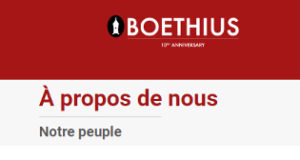A French client recently got in touch with us with some concern. They reported having taken a look at the French version of the Boethius website, and being struck by the abundance of mistakes therein. This is bad enough for a corporate website, but worse coming from a language services provider like Boethius.
Also, there is no French version of our website.
What was going on? The answer soon became clear. Our client had been looking at a French translation of our website that had been automatically generated by Google. Why hadn’t they realized? Because they hadn’t asked for this automatic translation: it had just appeared on their screen when navigating to our website. Our client uses Google Chrome, and, as we found out with some effort, Chrome will automatically translate foreign websites into the language set as default in the user’s browser settings. No notification is given about this, which led our client to believe the automatically-translated French version of our website was our own.
And no wonder our client was alarmed. Here are just some of the issues we found when comparing our website to Google’s version.
 The “Our People” section (in which we talk about our staff) is translated as Notre peuple. Peuple in French doesn’t mean “human beings in general” (that would be gens), but rather “the citizens of a country, the populace” or “a particular nation, community or ethnic group”. Peuple is what Moses would have said in French when he told the Pharaoh to let his people go.
The “Our People” section (in which we talk about our staff) is translated as Notre peuple. Peuple in French doesn’t mean “human beings in general” (that would be gens), but rather “the citizens of a country, the populace” or “a particular nation, community or ethnic group”. Peuple is what Moses would have said in French when he told the Pharaoh to let his people go.
![]()
- It translated our description of translation as a “medieval trade” as commerce médiéval. Commerce in French means trade as commerce, as the sale and purchase process. The English meaning here, however, is that of trade as a job, as a profession.
![]()
- It translated “review by separate parties” as révision par partis distincts. Now the French word partis means parties in the sense of a group of people who share an opinion or interest, or in the sense of political parties. In this context, we are talking about parties in the abstract sense, as a person or group that constitutes a participant in a process, which is partie.
![]()
- It translated “a complex dispute” as un conflit complexe. “Dispute” here means litigation, a lawsuit. Whereas in French conflit is “conflict”, as used to describe a serious disagreement or argument, or else warfare. In legal terms, conflit is the very specific situation whereby two types of jurisdiction or two courts at the same level seek, or refuse, to deal with the same case. Thus, the situation in Ukraine is un conflit; a lawsuit is not.

- It translated “Chinese output” (referring to text in Chinese generated as the result of a process) as une sortie en chinois. “Output” can be translated as sortie when it modifies another term: for example, “an output device” is translated as un périphérique de sortie. However, when output is considered as an entity in itself, as in this case, the correct translation would be production: la production en chinois. Une sortie en chinois means something like “an exit in Chinese”, or “a Chinese outing”.

- We have a post on our website dealing with the intricacies of translating the Portuguese legal term Visto. The point of our post is precisely that it is often best to leave the term untranslated, as there is no single English term that covers its multiple meanings. Google nonetheless took it upon itself to translate Visto as Visite, a visit, in the very title of our post.
Our client had never been notified that websites would be automatically translated on their browser, nor were we warned about this fact – which could be quite a problem for a translation agency. We have jokingly referred to this default translation setting as “non-consensual translation”, but it seems to us that there is a serious issue at stake. If the Google-translated text is presented as a non-disclosed givens, then the reality of automatic translation is obscured – and any flaws in it (and the mistakes above are potentially very serious) are likely to be attributed to the wrong party.
On a brighter note, we have managed to find a solution to Chrome’s insidious translation feature which our readers may find useful. Our website is run on the CMS WordPress platform. We added this piece of code between the <head> and </head> labels:
<meta name=”google” content=”notranslate” />
Even though the website can still be automatically translated, it prevents Chrome from doing so by default. And no doubt other technical options exist.
By translating websites in this manner, Google is essentially doing two things:
- It intervenes on content it does not own.
- It withholds this intervention from users (both website owners and readers), by making it particularly hard to detect and change.
What is elsewhere being touted as cost-free convenience is implemented on the premise of concealing its presence, which effectively deprives users of the option to refuse – not to mention the many pitfalls discussed above.
The implications seem to be rather profound. Whether it is deliberate or not, Google’s actions amount not just to fostering their translation product, but to naturalizing it. In so doing, we believe they reflect and advance a particular understanding of language – of what language is and what it does – by which translation is ultimately regarded as an equation expressing a biunivocal function that can be solved by an algorithm. Indeed, both machine learning and the artificial neural networks on which large language models are based are statistical and, as such, rely on probabilistic functions. One ramification of this understanding is that any imperfections in automatic translation would be attributable to the fact that language models are still limited – but, given indefinitely large sets of data and an indefinitely increasing amount of computational power, perfect translation (and, some argue, superhuman intelligence) would be achieved. (We are exploring this point further in our AI series).
Whatever the intellectual merits of such understanding, it does seem to align with Google’s business interests better than it does with ours – and those of our readers.
This incident, in all, has been quite instructive. We have learned that, like the pop-up windows of yesteryear and the cookie policies of today, website languages are worth a moment’s pause before innocently browsing on. One may be rewarded with the ever-empowering choice of saying ‘no’.
